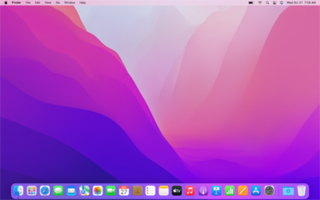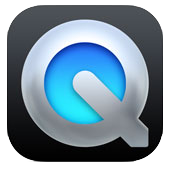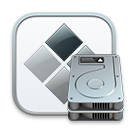See also
- Snow Leopard Trust, an organisation working for the conservation of the snow leopard
- Snow lion
The snow leopard is a type of large cat.
Snow Leopard, snow leopard or The Snow Leopard may also refer to:

macOS is a proprietary graphical operating system developed and marketed by Apple Inc. since 2001. It is the primary operating system for Apple's Mac computers. Within the market of desktop and laptop computers it is the second most widely used desktop OS, after Microsoft Windows and ahead of Chrome OS.

QuickTime is an extensible multimedia framework developed by Apple Inc., capable of handling various formats of digital video, picture, sound, panoramic images, and interactivity. Created in 1991, the latest Mac version, QuickTime X, is available for Mac OS X Snow Leopard up to macOS Mojave. Apple ceased support for the Windows version of QuickTime in 2016, and ceased support for QuickTime 7 on macOS in 2018.

macOS Server, formerly Mac OS X Server and OS X Server, is a series of Unix-like server operating systems developed by Apple Inc., based on macOS and later add-on software packages for the latter. macOS Server adds server functionality and system administration tools to macOS and provides tools to manage both macOS-based computers and iOS-based devices.
The history of macOS, Apple's current Mac operating system formerly named Mac OS X until 2012 and then OS X until 2016, began with the company's project to replace its "classic" Mac OS. That system, up to and including its final release Mac OS 9, was a direct descendant of the operating system Apple had used in its Macintosh computers since their introduction in 1984. However, the current macOS is a Unix operating system built on technology that had been developed at NeXT from the 1980s until Apple purchased the company in early 1997.

iSync is a software application first released by Apple Inc. on Jan 2, 2003. Apple licensed the core technology from fusionOne. It ran only under Mac OS X and was used to synchronize contact and calendar data from Address Book and iCal with many non-Apple SyncML-enabled mobile phones via a Bluetooth or USB connection. Support for many devices was built-in, with newer devices being supported via manufacturer and third-party iSync Plugins. Support for Palm OS organizers and compatible smartphones was removed with the release of iSync 3.1 and Mac OS X 10.6 Snow Leopard. BlackBerry OS, Palm OS, and Windows Mobile devices could not be used with iSync, but were supported by third-party applications. Before the release of Mac OS X 10.4, iSync also synchronized a user's Safari bookmarks with the then .Mac subscription service provided by Apple.
Xcode is Apple's integrated development environment (IDE) for macOS, used to develop software for macOS, iOS, iPadOS, watchOS, and tvOS. It was initially released in late 2003; the latest stable release is version 13.2.1, released on December 17, 2021, and is available via the Mac App Store free of charge for macOS Monterey users. Registered developers can download preview releases and prior versions of the suite through the Apple Developer website. Xcode includes Command Line Tools (CLT), which enable UNIX-style development via the Terminal app in macOS. They can also be downloaded and installed without the GUI.

XNU is the computer operating system (OS) kernel developed at Apple Inc. since December 1996 for use in the Mac OS X operating system and released as free and open-source software as part of the Darwin OS, which is the basis for the Apple TV Software, iOS, iPadOS, watchOS, and tvOS OSes. XNU is an abbreviation of X is Not Unix.
The leopard is one of the five "big cats" in the genus Panthera.

Mac OS X Leopard is the sixth major release of macOS, Apple's desktop and server operating system for Macintosh computers. Leopard was released on October 26, 2007 as the successor of Mac OS X 10.4 Tiger, and is available in two editions: a desktop version suitable for personal computers, and a server version, Mac OS X Server. It retailed for $129 for the desktop version and $499 for Server. Leopard was superseded by Snow Leopard in 2009. Leopard is the final version of macOS to support the PowerPC architecture as Snow Leopard functions solely on Intel based Macs.

The Mac transition to Intel processors was the process of changing the central processing unit (CPU) of Apple Inc.'s line of Mac computers, as well as its server offerings at the time, from PowerPC to Intel x86 processors.
Directory Utility is a utility included with the macOS operating system to configure connections to directory services.

ODBC Administrator is a 32-bit utility in the Mac OS X operating system for administering ODBC, which enables interaction with ODBC-compliant data sources. Features include connection pooling, trace log creation, and ODBC driver management, among other administration features.

Boot Camp Assistant is a multi boot utility included with Apple Inc.'s macOS that assists users in installing Microsoft Windows operating systems on Intel-based Macintosh computers. The utility guides users through non-destructive disk partitioning of their hard disk drive or solid state drive and installation of Windows device drivers for the Apple hardware. The utility also installs a Windows Control Panel applet for selecting the default boot operating system.
Gears, formerly Google Gears, is discontinued utility software offered by Google to create more powerful web apps by adding offline storage and other additional features to web browsers. Released under the BSD license, Gears is free and open-source. Gears was conceived at a time when a comparable alternative was not available. However, Gears was discontinued in favor of the standardized HTML5 methods that eventually became prevalent.

Stacks are a feature found in Apple's macOS, starting in Mac OS X Leopard. As the name implies, they "stack" files into a small organized folder on the Dock. At the WWDC07 Keynote Presentation, Steve Jobs stated that in Leopard, the user will be given a default stack called Downloads, in which all downloaded content will be placed.

Mac OS X Snow Leopard is the seventh major release of macOS, Apple's desktop and server operating system for Macintosh computers.
Grand Central Dispatch, is a technology developed by Apple Inc. to optimize application support for systems with multi-core processors and other symmetric multiprocessing systems. It is an implementation of task parallelism based on the thread pool pattern. The fundamental idea is to move the management of the thread pool out of the hands of the developer, and closer to the operating system. The developer injects "work packages" into the pool oblivious of the pool's architecture. This model improves simplicity, portability and performance.

Mac OS X Lion, also known as OS X Lion, is the eighth major release of macOS, Apple's desktop and server operating system for Macintosh computers.

Gatekeeper is a security feature of the macOS operating system by Apple. It enforces code signing and verifies downloaded applications before allowing them to run, thereby reducing the likelihood of inadvertently executing malware. Gatekeeper builds upon File Quarantine, which was introduced in Mac OS X Leopard and expanded in Mac OS X Snow Leopard. The feature originated in version 10.7.3 of Mac OS X Lion as the command-line utility spctl. A graphical user interface was originally added in OS X Mountain Lion (10.8) but was backported to Lion with the 10.7.5 update.

Craig Federighi is an American engineer and business executive who is the senior vice president (SVP) of software engineering at Apple Inc. He oversees the development of iOS, iPadOS, macOS and Apple's common operating system engineering teams. His teams are responsible for delivering the software at the heart of Apple's products, including the user interface, applications and frameworks.